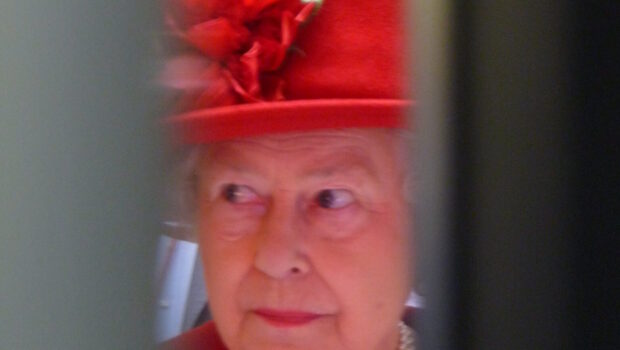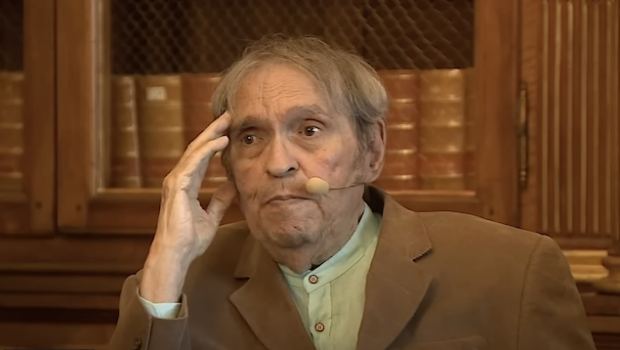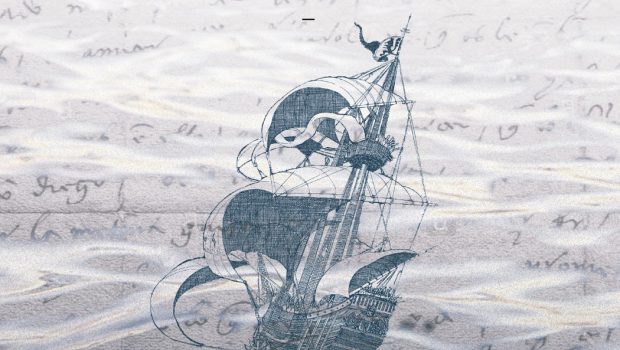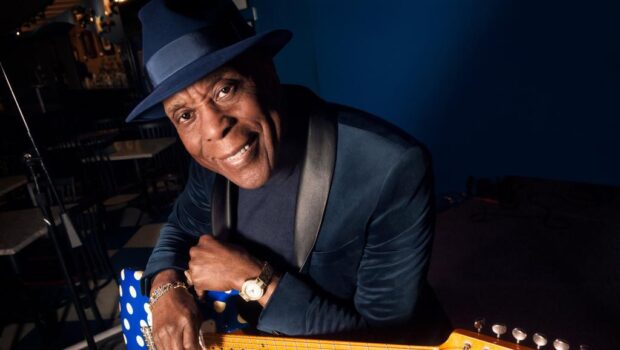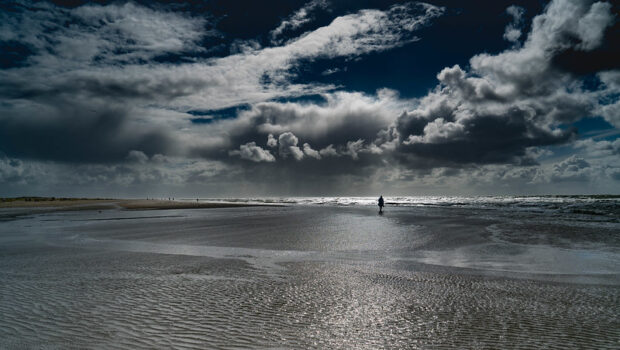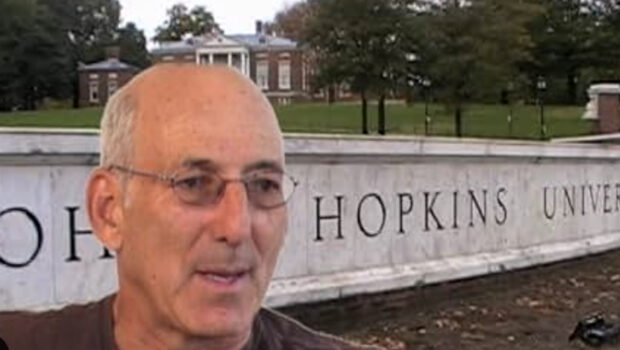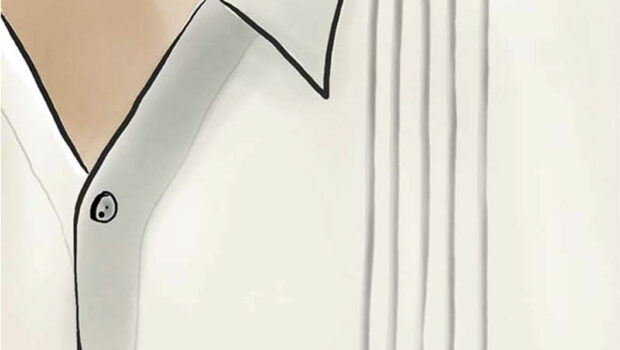UK, Septiembre 2022
Reino Unido, Septiembre 2022
Adriana Díaz Enciso
September comes with the certainty of the end of a summer that, in the year we reached 40 degrees, the roads started to melt and the earth in the UK literally burnt, seemed eternal. As if to remind us of the mutability of all things, the first days of the month are an alternation of rain and sunshine, light and gloom, and the unbearable question of whether it’s time now to put away our sandals, until next year. No matter how glorious/infernal summer may have been (and it was both), the return to this normality of uncertain weather brings some sensation of shelter—something we can trust, until further notice.
At Liverpool Street Station, on the 8th of September, while I queue to buy a sandwich for my journey, I notice a photograph of the queen in a festoon that’s been left behind since the Jubilee. It’s a strange moment: it seems to me that, from behind the mask of old age and the picture’s distant formality, a real woman, alive, peers for an instant, without giving anything away. We still don’t know that she’s unwell.
Through the train window I see the restored greenery. The rain has given us the landscape back. It feels miraculous that we’ve recovered it from the withered, scorched earth that surrounded us for quite a while and which broke your heart to see, with a not insignificant dose of terror.
I’m grateful for the relief and the return of the beloved landscape, but my mood is not precisely jubilant. It must be exhaustion. As so many other people in the planet, and no doubt in this country, I am tired of working and working and yet having no security in any way. The state of the world isn’t conducive to optimism either, and let’s add to this that just two days ago Liz Truss showed up at Downing Street’s door as the brand new Prime Minister (that we didn’t even elect), with her abject praise of Boris Johnson and foreshadowing what this country is in for: a reverse in what respects measures to tackle the climate crisis, lifting the ban on fracking (where was she when the earth was burning, that she didn’t see it? Campaigning). And let’s not even get started about what her government promises in the way of more and more poverty for the poor, more privileges for the privileged.
The day prior to my journey I was in Windsor with a cousin who was visiting. Windsor, so cute, so neat. I don’t know what the thoughts are of the homeless who spend the whole day looking at the castle’s walls. My cousin was surprised to see them. We talked about how things are down here; I told him I don’t understand how it is that we’re not all out in the streets, protesting (though it is true that the strikes are multiplying). Perhaps, I say, we’re not taking to the streets because we’re all so tired, with this daily business of survival. Then we talk about the situation in Mexico: even worse. But let’s not go there today; these pages are about these days in the UK, and that’s already quite a lot.
In Windsor my umbrella broke. I wanted to buy another one, the big, sturdy kind, but it being Windsor, all of them were stamped with the Union Jack. I preferred to get wet.
Anyway; I was saying that my mood on the train on the 8th of September is not cheerful. I’m on my way to Chelmsford, Essex, to read at an event a couple of fragments from my poetry pamphlet Flint, recently published, which is dedicated to the late Keith Flint and to my very dear friend Armando Vega Gil, who also took his own life the same year (2019). People tell me that it’s a luminous book, at least considering its subject matter, and I’d like to feel that luminosity somehow, but today I can’t find it; it seems to me frankly ridiculous to go and read from that book precisely when I’m feeling so downcast, but here I go, nonetheless. The landscape through the window (trees and more trees, as if it were some wood) before arriving at Chelmsford finally cheers me up.
***
I’m going to read before two talks for Ignite Chelmsford, a community cultural space managed by Marc De’ath. Today it will feature Darren Emerson, director of East City Films, talking about his VR interactive experience In Pursuit of Repetitive Beats, as well as Uncle Dugs, from Rinse FM, a multi-awarded DJ and historian of the rave culture. Music at the end will be courtesy of Intense Records.
Chelmsford, where Keith Flint grew up, is a small city traversed by the rivers Can and Chelmer; the town centre could be very handsome, had they not turned it into a gigantic shopping mall. The cathedral is a gentle and melancholic presence in this afternoon of brief sunshine and much rain. I am grateful for the opportunity to read in Chelmsford: I don’t want to reserve the circulation of my book to the literary circuit. I knew little of Flint before his death (and hardly anything about the rave culture or of dance and electronic music), but I’ve wanted, insofar as I am able, to bring the book here, to Essex, that was his home.
In the UK’s geography, Essex is not precisely known for its culture, and it’s an often-vilified county, looked down upon.
Before the event, the bar opens in the space where Ignite Chelmsford’s gatherings take place each month, and I find myself among a mix of people of different ages, joyful, friendly, and utterly enthusiastic. As I talk with some of them, I realise that there are indeed interesting things going on in their community. Music is an important part of that exchange, and during the weekend there will be a record fair.
Shortly before the talks start we find out about the death of Queen Elizabeth II. The consensus seems to be that the news is sad, though expected, given her age, but nobody seems to be really affected. The event goes on in the best of moods.
***
What do I think, or feel, as a Mexican who’s been living in the UK for the past 23 years, as I hear about the queen’s passing? Though it is true that the British monarchy exerts an unwholesome fascination on the rest of the world (I still remember, as a teenager, my mother’s excitement as she watched on TV that ill-starred wedding, described as a “fairy-tale”), it is definitely not part of my culture. I don’t have the slightest idea, for instance, why princes William and Harry, who I keep on mixing up, are angry at each other, and I don’t very much care. Royalty for me isn’t so much from another country, as from another planet. For the same reason, I have no elements to judge it with any authority. I know there was a picture of the queen in the ceremony where I got my British nationality, but I wasn’t forced to sing “God Save the Queen”, though I do remember that the national anthem was played in the Town Hall’s rather defective sound system, and it’s not altogether clear to me whether that made of me a “subject” or not—if I am, that is, of my identities, the most outlandish. I have heard many convincing arguments as to why the monarchy shouldn’t exist; far fewer equally convincing in its defence, though they do exist, and all I have clear is that it isn’t black and white, and that getting rid of it is not as easy as a tooth extraction. Because I don’t have the experience of what it is to grow up in a monarchy, I try to respect those for whom it has an important meaning, and also those who loathe it. They all have their reasons. Personally, it leaves me rather indifferent, and a bit confused.
But I sort of liked the queen. In common with many, I believe she was a woman who carried out with dignity, sobriety and discretion what she believed was a service and her duty. I may not agree about that service having been necessary, but she seemed to me a decent public figure (something which, of course, cannot be said about everyone in her family), with the terrible exception of her blind spot: the protection of that rogue son of hers, Andrew. When her Jubilee came in June this year, it seemed to me logical that the 70 years of her reign were celebrated, and that it would be naïve and a bit unfair to expect it not to be so, but when I saw the squandering of money involved in the celebrations, precisely when the country’s going through one of its worst financial crisis, and many people simply don’t have enough to eat, I was furious. It would have been a gracious gesture of sensitivity and empathy to tone the whole thing down. The display of power was obscene and vulgar.
I was even more furious when I saw in the news the happy crowds, celebrating an extravagance that went directly against them. That is definitely not what I have in mind when I say that people in this country should take to the streets.
But I’ve said it already: in general, I respected the queen, though not so much the institution she represented. News of her death reminded me, I don’t know why, of that image of hers—an old lady in mourning and with a black facemask, sitting completely alone at Westminster’s Abbey during her husband’s funeral in 2021. It’s a tough image. Of course, innumerable people all over the world have had to face the death of loved ones in terrible circumstances since the beginning of the pandemic. It’s just that it cannot be easy to have the whole world gawking at your pain.
***
But let’s go back to the world of us, ordinary people. At Ignite Chelmsford on this 8th of September, when Darren Emerson talks about In Pursuit of Repetitive Beats, he mentions the beginnings of the underground movement of illegal parties that grew from the peak of acid house in the late 1980s, at the end of what he defines as Margaret Thatcher’s “reign… of terror”. The 90s saw that culture flourish, and though it was perceived as purely hedonistic, through its demolition of all kinds of social and racial barriers as a liberating reaction to the Thatcherism’s atmosphere, it took on a strong political component, as it confronted the establishment and the persecutory hysteria to which they wanted to sacrifice it, as many other youth cultural movements.
Afterwards, Uncle Dugs leads us through a very funny narrative of how, out of his love for music, he became one of the most loved DJs in a culture to which he has been devoted for decades, and thanks to which his life went a very different path from that of the “awful” plumber he says he was before. He also talks about his loyalty to Dagenham, where he grew up, which is now part of Greater London, but which still is, essentially, Essex.
(For me, in 1990s Mexico, rave culture went largely unnoticed. I was—wrongly, it goes without saying—convinced that the music of my liking was the only one that mattered. In Mexico, in those years, the political element of music was to a great extent channelled through the massive concerts that collectives of musicians, artists and students, of which I was part, used to organise. The above mentioned Armando Vega Gil was without doubt one of that movement’s pillars. During those gigs we informed the audience about what was really going on in the war in Chiapas, gathered aid for the civilian grassroots of the Zapatista Army of National Liberation and for the victims of the Acteal massacre, and they were also a way of protesting against the attempts at prohibition of open-air concerts. The bands that participated played rock, reggae or ska.)
During the questions’ session after the talks, with different generations talking over each other in their eagerness to affirm the culture that defined each of them, I remember the importance and urgency of music in human life (the importance and urgency it had for me, for instance, when I was involved in the organisation of those Mexican concerts). When a very young poet and rapper complains about how things have changed now, and the lack of counterculture in present-day Chelmsford, where young people just gather to drink sophisticated £8 cocktails, Uncle Dugs suggests she starts her own movement. As Darren has said already, we’re unfortunately living a moment very similar to that of Thatcherism. Perhaps this is the time (always cyclical) to wake up and correct the course.
***
That night, before going up to my bed-and-breakfast room, I stop for a moment at the pub downstairs. I look at the light rain that makes the pavement sparkle, and I think of the queen’s death. Of course, it is a major change, even if only symbolic. When I was born, the queen was already there. In Mexico we have a saying, when someone is arrogant or demands undeserved privileges: “they’re hardly the queen of England”. The woman seemed to be as immovable as the Big Ben. Over here, coins, notes and stamps will change. Her death comes after a few convulsive years that have forced us to bear in mind the omnipresence of change: the pandemic, war in Ukraine, the threats of nuclear warfare, and the acceleration of climate change in a planet that doesn’t seem able to withstand much longer. Queen Elizabeth II really does symbolize another world.
Perhaps she couldn’t take receiving Liz Truss as her new Prime Minister two days before her death. Perhaps she had seen enough. I’m glad, I think, that she made it to celebrate her Jubilee. She looked happy. But I’m still furious that they spent so much.
***
The following morning is the same as any other day. Children and teenagers in Chelmsford hurry to school. On my way to Central Park, I see on the motorway near it a gigantic crown, apparently a monument put there to celebrate the Jubilee. It’s a very weird thing, somewhat threatening, as if directly from The Castle of Otranto, and I’m not sure I’m not hallucinating.
Central Park is spectacular. Not, it goes without saying, as much as that other more famous park with the same name in that also more famous city, but it is most beautiful nevertheless, with the River Can peacefully running through it and the viaduct’s arches looming ahead, passing the lake. I see a tall sequoia with its copperish bark, weeping willows by the river pecked at by the rain, a beautiful tree-lined avenue. Two days before he died, Keith Flint took part in the Saturday parkrun in Central Park. As an international pop star, he could have lived anywhere in the world, but he chose to stay in Essex, and he was an active member of the community. I understand that his Prodigy bandmates hold the same loyalty towards their homeland. I think of Uncle Dugs’ loyalty to Dagenham; of what gives meaning to people’s lives, and of how mysterious that is, in all our diversity.
I also think that it’s a good thing that Flint had the chance to run with others surrounded by this park’s beauty shortly before he died.
***
When I get back to Liverpool Street station in London, there are no more old Jubilee ornaments. Instead, there’s one of the official photos of the queen that we now will see around the whole country, and another one, more intimate and human, signed “with affection from the railway family”. There she is, dressed in blue, with her hat, sitting among several railway workers in their orange overalls.
On Saturday, the 10th of September, London—and the whole country—is mobilised for the multiple proclamation of Charles as King Charles III. Starting his reign at 73 years old, with a perpetual expression on his face of what seems like anguish, he cannot expect a reign as long as his mother’s, or as popular. He says that quite clearly in his accession speech, where he talks about his will to carry out “the heavy task that has been laid upon me” in “what remains” of his life. He doesn’t sound overly enthusiastic. He has been greeting the crowds outside Buckingham Palace, strangers who seem to love him well, and looking at the flower tributes to his mother. During the ceremonial silence before his proclamation as king outside the Royal Exchange, the only sound is that of a barking dog.
It is well known that the now king Charles has particular concerns about the ecological emergency. Though his privileges are unjustifiable, he represents an institution that is surely obsolete, and even though to ridicule him is a kind of national sport, we must admit that in his pronouncements on that regard he’s no idiot. It is thought that, as Prince of Wales, he was always exceedingly opinionated. I wonder if, as a king, he’ll exceed his duty again in the face of the backward steps in all things ecological promised by Liz Truss for her new government, or if now he’ll be forced to shut his mouth for good, which is the monarch’s required position. I would like to see them debate on the matter, with consequences, but I’m afraid it won’t happen.
***
All the newsletters I’m subscribed to are sending some message related to the queen’s passing. It’s a bit too much. The messages are respectful; careful, also, of not causing offense, or at least not too much, to the monarchy’s opponents. My favourite is by Michael Schmidt, founder of the Carcanet publishing house and the PN Review, who finds a perfect balance, with humour and elegance, remembering the two occasions in which he had the chance to see the queen move among poets. For his part, John Lydon, aka Johnny Rotten, whose incendiary lyrics and rendering with the Sex Pistols of “God Save the Queen” caused so much outrage in that other Jubilee in 1977, sends a message with the photograph of Elizabeth II used for the single’s launch, but now clean of the letters that defaced her. “Rest in Peace Queen Elizabeth II”, reads the message: “Send her victorious”.
Extinction Rebellion announces that the Festival of Resistance that would take place this weekend, including the taking of Hyde Park (one of the royal parks) will be postponed, after weighing up the risks involved in the mobilization during such peculiar days. XR does take to the streets, regardless how hard Boris Johnson’s administration tried to restrict that right.
***
There have been many cannon shots in honour of the deceased queen and the new king, pageantry and ceremonies all hermetic to me, and carried out in full solemnity by people with the most extravagant outfits. That of the trumpeters who play the fanfares is all golden and flashes in the sun.
Crowds keep on gathering around Buckingham Palace, where they’ve stopped allowing the delivery of more floral tributes. Instead, they’ve designated a special area in Green Park next door, but people also leave them spontaneously under any tree, or even on the branches. Some children’s dramatic messages, no doubt influenced by the adults’ reaction, call my attention: a girl draws many faces crying their eyes out and a kind of humanoid flying arrow that is also crying; in another, the child’s words say, “Sorry. I miss you. Please come back”, and there are others with drawings of the queen, with her eternal hat. I’m amused by the one starting with a respectful “Dear the Queen”.
One day, not long ago and also in Green Park, I was in a bad mood, I don’t remember why exactly thinking of the queen’s privileges, and suddenly I told myself, “But the poor woman can’t go for a walk in Green Park just outside her door and then go to a café, like any normal citizen. What kind of life is that?” Now I think that it’s a good thing that the floral tributes come out of the palace and fill the park—a kind of symbolic liberation, which I suppose always comes handy to the souls of the dead.
Whatever it is that we think of the monarchy, there is no doubt that for many people this has some meaning. We may problematize things and wonder what does it mean that something means something for someone. There can also be terrible meanings, and of course there are voices questioning the queen’s importance, or saying that it’s about time to finally put an end to monarchy. There are also debates between people from the Commonwealth who are mourning Elizabeth II and those who are angry, and with good reason, for the harm caused by the British Empire and the absence of reparation. Even so, I am seeing with my own eyes quite a lot of people, mixed with the curious (like myself) and tourists, who are genuinely saddened, and rather than feeling I have the right to simply dismiss them and sweep them aside, I want to see the individuals behind the news. I want to understand. I also wonder what the death of the queen means for that other old woman who’s begging outside Green Park, watching the hordes that ignore her.
I have spent hours these days on several buses’ upper deck watching the city, watching people, trying to find the answer: what does the death of this woman that some call Her Majesty mean to the inhabitants of this country. Despite the mobilisations provoked by it, people, of course, go on living their lives. These days I have seen multitudes, as multitudes are in London—of all races, all nationalities and all conceivable looks. All over the city there are images of the queen, many enormous. Some show her already old. In others, we see her on the day she was crowned, young and beautiful. The only thing clear to me is that all of us, royalty or not, these crowds and the royal family we see in our screens, all of us, are going to the same place. We’re all walking towards death, and there is a sensation of vertigo in watching so much life, so sprightly, including mine, knowing what the final stop is—indeed common to all. I have seen happy people, tired or grumpy people, thoughtful people; I have seen the stoic bus driver that keeps silent when a passenger yells at him; I have seen people on their own and people with their partners, families, friends; I have seen people talking to themselves, or with evident mental health problems; people who are ill and those who are anguished. These days are conducive for stumbling on the Buddha’s first three visions (and hopefully this journey and these reflections will draw me close to the fourth one too, even if I can’t imagine how): the inevitability of sickness, old age and death. Undoubtedly, the first noble truth is made manifest everywhere: suffering in human life.
The 10th of September is not only the day of Charles III’s accession to the British throne. It is also the World Suicide Prevention Day.
***
On the 11th of September I hear, with enormous sadness and dismay, of the passing of Javier Marías, magnificent Spanish author who no doubt was deserving of the Nobel prize. I never met him personally, but we had a few brief epistolary exchanges in which he was kind and generous, and he helped me find the Friends of Arthur Machen, a literary society devoted to the genius Welsh author that Marías admired and knew well. Marías’ literary passions had a marked anglophile dimension. He was in a coma when the queen died, so he didn’t know. I wonder what he would think—he, king of the intangible literary Kingdom of Redonda—about all this pomp and ceremony, about that funeral cortege that is slowly crossing Scotland, with people in the streets, roads, bridges and paths waiting to watch it pass, throwing flowers, and what he would have written in his column for El País.
***
On Saturday I attend my friend Anne-Marie’s birthday party in a pub in Bethnal Green, east London. Her friend Jamie is in charge of the music, with his rendering, rich in emotion and verve, of songs by The Beatles, The Smiths, Johnny Mathis, Bowie, while on a screen in a corner images of the queen’s entire life are played ceaselessly. A curious combination, in which triumph belongs, irrefutably, to life. I think again of the importance of music in our lives, and of the things that give meaning to our passing—alas, so brief!—through this world.
During these days of rambling, trying to find a common feature in the human face—the illustrious and the anonymous, that singled out and that of the crowds—I suddenly find myself facing the full moon, rising flushed and glowing among the clouds that are finally dissolving. It’s good to be alive, I think. It is good.

Adriana Díaz-Enciso es poeta, narradora y traductora. Ha publicado las novelas La sed, Puente del cielo, Odio y Ciudad doliente de Dios, inspirada en los Poemas proféticos de William Blake; los libros de relatos Cuentos de fantasmas y otras mentiras y Con tu corazón y otros cuentos, y seis libros de poesía. Su más reciente publicación, Flint (una elegía y diario de sueños, escrita en inglés) puede encontrarse aquí.
©Literal Publishing. Queda prohibida la reproducción total o parcial de esta publicación. Toda forma de utilización no autorizada será perseguida con lo establecido en la ley federal del derecho de autor.
Las opiniones expresadas por nuestros colaboradores y columnistas son responsabilidad de sus autores y no reflejan necesariamente los puntos de vista de esta revista ni de sus editores, aunque sí refrendamos y respaldamos su derecho a expresarlas en toda su pluralidad. / Our contributors and columnists are solely responsible for the opinions expressed here, which do not necessarily reflect the point of view of this magazine or its editors. However, we do reaffirm and support their right to voice said opinions with full plurality.
Septiembre llega con la certidumbre del fin de un verano que, en el año en que alcanzamos los 40 grados, se empezaron a derretir las carreteras y la tierra en el Reino Unido ardió (literalmente), parecía eterno. Como para recordarnos la mutabilidad de todas las cosas, los primeros días del mes son una alternancia de lluvia y sol, luz y oscuridad, la insoportable pregunta de si ya llegó la hora de tener que guardar las sandalias, hasta el año que entra. Por glorioso/infernal que haya sido el verano (y fue las dos cosas), el regreso de esta normalidad de clima incierto trae cierta sensación de cobijo: algo en lo que podemos confiar, hasta nuevo aviso.
En la estación de Liverpool Street, el 8 de septiembre, haciendo fila para comprar un sándwich para mi viaje, me fijo en una fotografía de la reina en un adorno que se quedó rezagado desde el Jubileo. Es un momento extraño: me parece que, detrás de la máscara de la vejez y la distante formalidad de la foto, asoma por un instante una mujer de verdad, viva, con sus secretos bien guardados. Todavía no sabemos nada de que amaneció enferma.
Por la ventana del tren veo el verdor renovado: la lluvia nos ha devuelto el paisaje. Parece milagroso haberlo recobrado de esa tierra seca y calcinada que nos rodeó durante un buen rato y que rompía el alma mirar, con una dosis no escasa de terror.
Agradezco el alivio y el regreso del paisaje amado, pero mi ánimo no es precisamente jubiloso. Ha de ser el cansancio. Como tanta gente en el planeta, y sin duda en este país, estoy cansada de trabajar y trabajar y no tener sin embargo forma alguna de seguridad. El estado del mundo tampoco favorece el optimismo, y a eso sumemos que hace apenas dos días Liz Truss se apareció a la entrada de Downing Street como flamante primera ministra (que ni siquiera elegimos), con su abyecta alabanza a Boris Johnson y prefigurando lo que le espera al país: reversa en lo que toca a medidas para frenar la crisis climática, levantando la prohibición de la fracturación hidráulica (¿dónde estaba cuando la tierra ardía, que no la vio? Haciendo campaña). Y ya ni hablemos de lo que promete su gobierno en forma de más y más pobreza para los pobres, más privilegios para los privilegiados.
El día anterior a mi viaje estuve en Windsor con un primo que venía de visita. Windsor tan lindo, tan mono. No sé qué pensarán los homeless que se pasan todo el día viendo las murallas del castillo. A mi primo le sorprendió verlos. Hablamos de cómo están las cosas aquí; le dije que no entiendo cómo es que no estamos todos en la calle, protestando (aunque es cierto que las huelgas se multiplican). A lo mejor, le digo, no salimos a las calles porque estamos todos tan cansados con el asunto cotidiano de la supervivencia. Luego hablamos de la situación en México: peor todavía —pero no vayamos allá hoy, que estas páginas son sobre los tiempos que corren en el Reino Unido, y ya es bastante.
En Windsor se rompió mi paraguas. Quise comprar otro, de esos grandes que aguantan, pero todos, siendo Windsor, tenían estampada la Union Jack. Preferí mojarme.
Pero decía que mi ánimo en el tren, el 8 de septiembre, no es alegre. Voy rumbo a Chelmsford, Essex, a leer en un evento un par de fragmentos de mi plaquette de poesía Flint, recién publicada, y que está dedicada al fallecido Keith Flint y a mi muy querido amigo Armando Vega Gil, que también se quitó la vida el mismo año (2019). La gente me dice que es un libro luminoso, al menos considerando el tema, y yo quisiera sentir esa luminosidad de alguna forma, pero hoy no la encuentro; me parece francamente ridículo ir a leer justo de ese libro sintiéndome tan abatida, pero ahí voy. El paisaje por la ventana (los árboles y más árboles, como si fuera un bosque), antes de entrar a Chelmsford, termina por animarme.
***
Voy a leer antes de dos charlas para Ignite Chelmsford, espacio cultural comunitario coordinado por Marc De’ath. Hoy hablará Darren Emerson, director de East City Films, sobre su creación interactiva de realidad virtual In Pursuit of Repetitive Beats, así como Uncle Dugs, de Rinse FM, DJ galardonado e historiador de la cultura del rave. La música al final será cortesía de Intense Records.
Chelmsford, donde Keith Flint creció, es una ciudad pequeña, atravesada por el río Can y el Chelmer; el centro podría ser muy lindo, si no lo hubieran convertido en un gigantesco centro comercial de punta a punta. La catedral es una imagen apacible y melancólica en esta tarde de breve sol y mucha lluvia. Agradezco la oportunidad de leer en Chelmsford: no he querido reservar la circulación de mi libro al circuito literario. Poco sabía de Flint antes de su muerte (y casi nada de lo que fue la cultura del rave ni de la música dance y electrónica), pero he querido, en la medida de mis posibilidades, traer el libro aquí, a Essex, que era su casa.
En la geografía del Reno Unido, Essex no es conocido precisamente por su cultura, y es un condado a menudo vilipendiado, visto por encima del hombro.
Antes de que inicie el evento se abre el bar en el espacio donde las reuniones de Ignite Chelmsford tienen lugar cada mes, y me encuentro entre una mezcla de gente de distintas edades, alegre, amistosa, y de lo más entusiasta. Charlando con algunos de ellos me doy cuenta de que sí que están sucediendo cosas interesantes en su comunidad. La música es parte importante de este intercambio, y el fin de semana habrá una feria del disco.
Poco antes de las charlas nos enteramos del fallecimiento de la reina Isabel II. El consenso parece ser que la noticia es triste, aunque esperada, dada su edad, pero nadie parece realmente afectado. El evento transcurre en el mejor de los ánimos.
***
¿Qué pienso, o siento, como una mexicana que lleva viviendo 23 años en el Reino Unido, al enterarme de la muerte de la reina? Si bien es cierto que la monarquía británica ejerce una fascinación malsana en el resto del mundo (todavía recuerdo, de adolescente, la emoción de mi madre viendo en la tele esa boda malhadada… descrita como “de cuento de hadas”), definitivamente esto no es parte de mi cultura. No tengo, por ejemplo, la menor idea de por qué los príncipes William y Harry, a los que sigo confundiendo, están peleados, y me importa muy poco. La realeza para mí es no tanto como de otro país, sino como de otro planeta. Por lo mismo, no tengo elementos para juzgarla con autoridad. Sé que había un retrato de la reina en la ceremonia donde adquirí mi nacionalidad británica, pero no fui obligada a cantar “God Save the Queen”, aunque sí que pusieron el himno nacional en un sistema de sonido del Ayuntamiento bastante defectuoso, y no me queda del todo claro si eso me convirtió en “súbdita” o no —si lo soy, es, de mis identidades, la más estrafalaria. He escuchado muchos argumentos convincentes sobre por qué la monarquía no debería existir; muchos menos que sean de suyo convincentes en su defensa, aunque también existen, y lo único que tengo claro es que el asunto no es en blanco y negro, y que deshacerse de ella no es tan sencillo como sacar una muela. Porque no tengo la experiencia de lo que es crecer en una monarquía, trato de respetar a aquellos para quienes la misma tiene un significado importante, y también a quienes la detestan. Todos tienen sus motivos. A mí en lo personal, me deja más bien indiferente y un tanto confusa.
Pero la reina me caía bien. Creo, como muchos, que fue una mujer que desempeñó con dignidad, sobriedad y templanza lo que ella creía que era servicio y su deber. Puedo no estar de acuerdo con que ese servicio fuera necesario, pero me parecía una figura pública decente (cosa que no puede decirse, claro está, de todos en su familia), con la excepción terrible de su punto ciego: la protección de esa fichita, su hijo Andrew. Cuando fue el Jubileo en junio de este año, me pareció que era lógico que se celebraran los 70 años de su reinado, y que sería naíf y un tanto injusto esperar que no fuera así, pero cuando vi el derroche de dinero que significó la celebración, justo cuando el país atraviesa una de sus peores crisis financieras y a mucha gente simplemente no le alcanza para comer, me enfurecí. Hubiera sido un gesto de sensibilidad y empatía atenuar los gastos. El desplante de poder fue, sin embargo, obsceno y vulgar.
Más me enfureció ver en las noticias a las felices multitudes celebrando un despilfarro que iba directamente en su contra. Definitivamente no es a eso a lo que me refiero cuando digo que la gente en este país debería estar en las calles.
Pero ya lo he dicho: en general, respetaba a la reina, aunque no tanto a la institución que representaba. La noticia de su muerte me recordó, no sé por qué, esa imagen suya, la de una anciana de luto y con cubrebocas negro, sentada completamente sola en la Abadía de Westminster durante el funeral de su esposo en 2021. Es una imagen tremenda. Por supuesto, innumerables personas en todo el mundo han tenido que enfrentar la muerte de seres queridos en terribles circunstancias desde el inicio de la pandemia. Es nada más que no ha de ser fácil tener al mundo entero escudriñando tu dolor.
***
Pero volvamos al mundo de la gente de a pie. En Ignite Chelmsford este 8 de septiembre, cuando Darren Emerson presenta In Pursuit of Repetitive Beats, habla de los inicios del movimiento clandestino de fiestas ilegales que creció desde el apogeo del acid house a fines de la década de 1980, durante el final de lo que Emerson define como el “reinado… de terror” de Margaret Thatcher. Los años noventa vieron florecer esta cultura que, si bien era percibida como puramente hedonista, con su demolición de barreras sociales y raciales de toda índole como reacción liberadora a la atmósfera creada por el thatcherismo, adquirió un fuerte componente político al enfrentarse al establishment y la histeria persecutoria de la que se le quería hacer víctima, como a tantos otros movimientos culturales juveniles.
Después, Uncle Dugs nos ofrece la narración simpatiquísima de cómo por amor a la música se convirtió en uno de los más queridos DJs de una cultura a la que se ha entregado durante décadas, y por la que su vida tomó un rumbo muy distinto de la del plomero “pésimo” que dice haber sido antes. Habla también de su lealtad al Dagenham en que creció, ahora parte del Londres conurbado, pero que sigue siendo, esencialmente, Essex.
(A mí, en el México de los años noventa la cultura del rave me pasó por alto. Estaba convencida de que la música de mi preferencia era la única que importaba. En México, en esos años, el elemento político de la música estaba en buena medida concentrado en los conciertos que organizábamos diversos colectivos de músicos, artistas y estudiantes —el arriba mencionado Armando Vega Gil era sin duda uno de los pilares de ese movimiento— para informar a los asistentes de lo que realmente estaba sucediendo en la guerra en Chiapas, juntar acopio para las bases de apoyo del EZLN y las víctimas de la masacre de Acteal, y protestar contra los intentos de prohibición de los conciertos al aire libre. Las bandas que participaban en estos conciertos eran de rock, reggae o ska.)
En la sesión de preguntas al final de las charlas, con distintas generaciones arrebatándose la palabra en su afán por afirmar la cultura que las definió, recuerdo la importancia y la urgencia de la música en la vida humana (las mismas que tenían para mí, por ejemplo, cuando estaba involucrada en la organización de esos conciertos en México). Cuando una jovencita, poeta y rapera, se queja de que ahora las cosas han cambiado, de que no hay nada de contracultural en Chelmsford y los jóvenes se reúnen nada más para beber sofisticados cocteles que cuestan ocho libras, Uncle Dugs la anima a que empiece ella el nuevo movimiento. Como ya lo ha dicho Darren, vivimos, por desgracia, un momento muy parecido al del thatcherismo. Quizá sea este el momento (siempre cíclico) de despertar y cambiar el rumbo de las cosas.
***
Esa noche, antes de subir al cuarto de mi bed and breakfast, me detengo un momento en el pub de abajo. Veo la lluvia ligera que hace brillar el pavimento, y pienso en la muerte de la reina. Claro que es un gran cambio, aunque sea sólo simbólico. Cuando nací, la reina ya estaba ahí. En México tenemos el dicho, cuando alguien es altanero o exige privilegios que no le corresponden, “ni que fuera la reina de Inglaterra”. La mujer parecía tan inamovible como el Big Ben. Acá, cambiarán las monedas, los billetes, los timbres postales. Su muerte llega tras unos años convulsos que nos han obligado a tener presente la omnipresencia del cambio: la pandemia, la guerra en Ucrania, las amenazas de guerra nuclear, y el acelerado cambio climático en un planeta que no parece resistir mucho más. La reina Isabel II realmente simboliza otro mundo.
Quizá, se me ocurre, no resistió tener que recibir a Liz Truss como su nueva primera ministra dos días antes de su muerte. Quizá ya había visto suficiente. Qué bueno, pienso, que alcanzó a celebrar su Jubileo. Se veía contenta. Pero qué furia que se gastaran tanto.
***
La mañana siguiente es la de cualquier otro día. Los niños y adolescentes de Chelmsford van a la escuela. Rumbo a Central Park, veo en la carretera de al lado una corona gigantesca, aparentemente un monumento para celebrar el Jubileo. Es una cosa muy extraña, un tanto amenazante, como salida de El Castillo de Otranto, y no sé si es una alucinación.
Central Park es espectacular. No tanto, sobra decirlo, como ese otro parque más famoso del mismo nombre en una ciudad más famosa también, pero es bellísimo de todas formas, con el río Can cruzándolo, apacible, y los arcos del viaducto ferroviario alzándose al fondo, pasando el lago. Veo una secoya altísima con su tronco como de cobre, sauces junto al río picoteado por la lluvia, una hermosa avenida arbolada. Dos días antes de morir, Keith Flint participó en la carrera comunitaria de los sábados en Central Park. Como una estrella internacional de la música, podría vivir en cualquier parte del mundo, pero eligió quedarse en Essex, y era un miembro presente de la comunidad. Tengo entendido que sus compañeros de The Prodigy guardan la misma lealtad por su tierra de origen. Pienso en la lealtad de Uncle Dugs a Dagenham; en lo que le da significado a la vida de la gente, y en lo misterioso que es eso, en toda nuestra diversidad.
Qué bueno, pienso también, que Flint tuvo la oportunidad de correr con otros rodeado de la belleza de este parque poco antes de morir.
***
Cuando regreso en el tren a la estación de Liverpool Street, en Londres, ya no hay viejos adornos del Jubileo. Está en cambio una de las fotos oficiales de la reina que ahora veremos por todo el país, y otra más íntima, más humana, firmada “con afecto” por the railway family, un juego de palabras. Ahí la reina está sentada, vestida de azul, con su sombrero, entre varios trabajadores ferroviarios con su overol anaranjado.
El sábado 10 de septiembre Londres —y el país entero— se moviliza para la proclamación múltiple de Carlos como el rey Carlos III. Empezando su reinado a los 73 años, con una expresión perpetua en el rostro de lo que parece angustia, no puede esperar un reinado tan largo como el de su madre, ni tanta popularidad. Lo dice claro en su discurso de ascenso al trono, donde habla de su voluntad de “llevar a cabo la pesada tarea que le ha sido impuesta” en el tiempo que le quede de vida. No suena precisamente entusiasmado. Ha estado saludando a la multitud afuera de Buckingham Palace, extraños que parecen quererle bien, y mirando las ofrendas florales a su madre. Durante el silencio ceremonial antes de su proclamación como rey afuera de la Bolsa Real de Valores, lo único que se oye es a un perro que ladra.
Es bien sabido que el ahora rey Carlos tiene una particular preocupación por la emergencia ecológica. Aunque sus privilegios son injustificables, representa a una institución seguramente obsoleta, y pese a que ridiculizarlo es una especie de deporte nacional, hay que admitir que en sus pronunciamientos a este respecto no es ningún idiota. Como Príncipe de Gales, se piensa, se excedió siempre al expresar sus opiniones. Me pregunto si como rey se excederá también frente a los retrocesos prometidos en materia ecológica por Liz Truss para su nuevo gobierno, o si ahora sí se le exigirá que se calle la boca, que es la posición requerida del monarca. A mí me gustaría verlos debatir el tema, con consecuencias, pero me temo que no sucederá.
***
Todos los boletines informativos a los que estoy suscrita envían algún mensaje relativo al fallecimiento de la monarca. Es un poco demasiado. Los mensajes son respetuosos; cuidadosos también, eso se nota, de no ofender, o al menos no demasiado, a los opositores de la monarquía. Mi favorito es de Michael Schmidt, fundador de la editorial Carcanet y de la PN Review, que alcanza el equilibrio perfecto, con humor y elegancia, recordando las dos ocasiones en que pudo ver a la reina moverse entre poetas. Por su parte John Lydon, alias Johnny Rotten, cuya letra e interpretación incendiarias con los Sex Pistols de “God Save the Queen” causaran tanto escándalo en aquel otro Jubileo en 1977, envía un mensaje con la fotografía de Isabel II utilizada para lanzar el sencillo, pero ahora sin las letras borrándole el rostro. “Descanse en paz, reina Isabel II”, dice el mensaje. “Que vaya victoriosa.”
Extinction Rebellion anuncia que se pospone el Festival de Resistencia que llevaría a cabo este fin de semana, incluyendo la toma de Hyde Park (que es uno de los parques reales), tras sopesar los riesgos de la movilización en días tan peculiares. XR sí que sale a las calles, por más que la administración de Boris Johnson se haya esforzado en restringir este derecho.
***
Ha habido muchos cañonazos, en honor de la reina fallecida y del nuevo rey, desfiles y ceremonias para mí herméticos, llevados a cabo con toda solemnidad por personas con atavíos de lo más extravagantes. El de los trompeteros que tocan las fanfarrias es todo oro y relumbra al sol.
Se siguen congregando multitudes alrededor de Buckingham Palace, donde ya no permiten que se entreguen más ofrendas florales. En su lugar, se ha designado un área especial en el vecino Green Park, pero la gente las deja espontáneamente también junto a cualquier árbol, o incluso en las ramas. Me llaman la atención algunos dramáticos mensajes de niños, sin duda influenciados por la reacción de sus mayores: una niña dibuja un montón de rostros desechos en llanto y una especie de flecha humanoide voladora, que llora también; en otro, la letra infantil reza: “Lo siento. Te extraño. Por favor regresa.” En otros más los niños dibujan a la reina, con su eterno sombrero. Me hace reír el que empieza con un respetuoso “Querida la Reina”.
Un día, no hace mucho y también en Green Park, iba yo malhumorada, no recuerdo por qué exactamente pensando en los privilegios de la reina, y de pronto me dije: “Pero la pobre mujer no puede salir a pasear a Green Park ahí enfrente, y luego irse a tomar un café, como cualquier ciudadano normal. ¿Qué vida es ésa?” Ahora pienso que está bien que los tributos florales salgan del palacio y llenen el parque: una especie de liberación simbólica, que supongo no le ha de sobrar nunca a las almas de los difuntos.
Pensemos lo que pensemos de la monarquía, no hay duda de que hay mucha gente para la que esto tiene un significado. Podemos problematizarlo y preguntarnos qué significa que algo signifique algo para alguien. Puede haber también significados terribles, y por supuesto hay voces cuestionando la importancia de la reina, o diciendo que ya llegó la hora de acabar por fin con la realeza. Hay debates, por ejemplo, entre habitantes de la Commonwealth que lloran a Isabel II y la respetan, y los que están enojados, y con razón, por el daño causado por el Imperio Británico y por la ausencia de reparación. Aun así, yo estoy viendo con mis propios ojos a muchísima gente, mezclada con curiosos (como yo) y turistas, que está genuinamente entristecida, y en lugar de sentirme con derecho de simplemente descalificarla de un manotazo, quiero ver a las personas detrás de la noticia. Quiero entender. Me pregunto también qué significa la muerte de la reina para esa otra anciana que pide limosna afuera de Green Park, viendo pasar a estas hordas que la ignoran.
He pasado horas estos días en el piso de arriba de varios autobuses viendo la ciudad, viendo a la gente, tratando de encontrar la respuesta: qué significa la muerte de esta mujer a la que algunos llaman Su Majestad para los habitantes de este país. Pese a las movilizaciones provocadas por la misma, la gente, por supuesto, sigue haciendo su vida. Estos días he visto multitudes, como son las multitudes en Londres: de todas las razas, de todas las nacionalidades y de todas las apariencias concebibles. Por toda la ciudad hay imágenes de la reina, muchas enormes. Algunas la muestran ya anciana. En otras aparece el día de su coronación, joven y hermosa. Lo único que me queda claro es que absolutamente todos, realeza o no, estas multitudes y la familia real que vemos en las pantallas, todos, vamos al mismo lugar. Todos caminamos hacia la muerte, y hay una sensación de vértigo en ver tanta vida en semejante efervescencia, incluyendo la mía, sabiendo cuál es el destino final y, ese sí, común. He visto a gente feliz, gente cansada o malhumorada, gente reflexiva; he visto al estoico chofer de autobús que guarda silencio cuando una pasajera le grita; he visto a gente sola y gente con sus parejas, familias, amigos; he visto gente hablando sola, algunos con evidentes problemas de salud mental, y gente enferma o angustiada. Son, estos días, propicios para encontrarme con las tres primeras visiones del buda (y ojalá este recorrido y estas reflexiones me estén acercando a la cuarta también, aunque no tenga claro cómo): la inevitabilidad de la enfermedad, de la vejez y de la muerte. La primera noble verdad, sin duda, es manifiesta por todas partes: el sufrimiento en la vida humana.
El 10 de septiembre no es nada más el día de la ascensión formal al trono británico de Carlos III. Es también el Día Mundial de Prevención del Suicidio.
***
El 11 de septiembre me entero, con enorme tristeza y consternación, del fallecimiento de Javier Marías, escritor magnífico, que sin duda era merecedor del Nobel. No lo conocí en persona, pero tuve algunos muy breves intercambios epistolares en que fue gentil y generoso, y me ayudó a encontrar a la sociedad literaria Friends of Arthur Machen, dedicada al genial autor galés al que Marías conocía bien, y admiraba. Marías tenía una profunda vertiente anglófila en sus pasiones literarias. Estaba en coma cuando murió la reina y no se enteró. Me pregunto qué pensaría, él, rey del intangible reino literario de Redonda, de toda esta pompa y ceremonia, de ese cortejo fúnebre que atraviesa Escocia, con gente en las calles, carreteras, puentes y veredas viéndolo pasar, arrojando flores, y qué habría escrito en su columna de El País.
***
El sábado voy a la fiesta de cumpleaños de mi amiga Anne-Marie en un pub en Bethnal Green, en el este de Londres. Su amigo Jamie se encarga de la música, con sus interpretaciones cargadas de emoción y brío de temas de los Beatles, The Smiths, Johnny Mathis, Bowie, mientras en una pantalla en un rincón del pub no dejan de pasar imágenes de la vida entera de la reina. Curiosa combinación, en la que el triunfo es, irrebatiblemente, de la vida. Pienso de nuevo en la importancia de la música en nuestras vidas, y en las cosas que le dan significado a nuestro paso, ¡ay, tan breve!, por aquí.
Durante estos días de vagabundear, tratando de encontrar un rasgo en común en el rostro humano —el célebre y el anónimo, el particularizado y el de las multitudes— me sorprende de pronto la luna llena, alzándose rojiza entre las nubes que al fin se alejan. Es bueno estar viva, pienso. Es bueno.
 Adriana Díaz-Enciso es poeta, narradora y traductora. Ha publicado las novelas La sed, Puente del cielo, Odio y Ciudad doliente de Dios, inspirada en los Poemas proféticos de William Blake; los libros de relatos Cuentos de fantasmas y otras mentiras y Con tu corazón y otros cuentos, y seis libros de poesía. Su más reciente publicación, Flint (una elegía y diario de sueños, escrita en inglés) puede encontrarse aquí.
Adriana Díaz-Enciso es poeta, narradora y traductora. Ha publicado las novelas La sed, Puente del cielo, Odio y Ciudad doliente de Dios, inspirada en los Poemas proféticos de William Blake; los libros de relatos Cuentos de fantasmas y otras mentiras y Con tu corazón y otros cuentos, y seis libros de poesía. Su más reciente publicación, Flint (una elegía y diario de sueños, escrita en inglés) puede encontrarse aquí.
©Literal Publishing. Queda prohibida la reproducción total o parcial de esta publicación. Toda forma de utilización no autorizada será perseguida con lo establecido en la ley federal del derecho de autor.
Las opiniones expresadas por nuestros colaboradores y columnistas son responsabilidad de sus autores y no reflejan necesariamente los puntos de vista de esta revista ni de sus editores, aunque sí refrendamos y respaldamos su derecho a expresarlas en toda su pluralidad. / Our contributors and columnists are solely responsible for the opinions expressed here, which do not necessarily reflect the point of view of this magazine or its editors. However, we do reaffirm and support their right to voice said opinions with full plurality.


